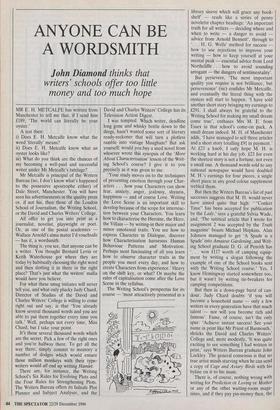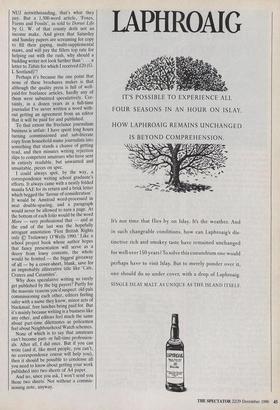ANYONE CAN BE A WORDSMITH
John Diamond thinks that
writers' schools offer too little money and too much hope
MR E. H. METCALFE has written from Manchester to tell me that, if I send him £189, `The world can literally be your oyster.'
A test then: i) Does E. H. Metcalfe know what the word `literally' means?
ii) Does E. H. Metcalfe know what an oyster looks like?
iii) What do you think are the chances of my becoming a well-paid and successful writer under Mr Metcalfe's tutelage?
Mr Metcalfe is principal of the Writers Bureau (no, I don't know what's happened to the possessive apostrophe either) of Dale Street, Manchester. You will have seen his advertisements in the quality press or, if not his, then those of the London School of Journalism, the Writing School, or the David and Charles Writers' College.
All offer to get you into print as a journalist, novelist, playwright or poet. Or, as one of the postal academies Wallace Arnold's alma mater I'd vouchsafe — has it, a wordsmith.
The thing is, you see, that anyone can be a writer. You thought Bernard Levin or Keith Waterhouse got where they are today by habitually choosing the right word and then slotting it in there in the right place? That's just what the writers' mafia would have you believe.
For what these smug initiates will never tell you, and what only plucky Judy Chard, Director of Studies of the David and Charles Writers' College is willing to come right out and say, is that `You already know several thousand words and you are able to put them together every time you talk.' Well, perhaps not every time, Miss Chard, but I take your point.
It's those several thousand words which are the secret. Pick a few of the right ones and you're halfway there. To get all the way there, simply commit to memory a number of dodges which would ensure those million monkeys with their type- writers would all end up writing Hamlet.
There are, for instance, the Writing School's Six Rules for Evolving Plots and the Four Rules for Strengthening Plots. The Writers Bureau offers its failsafe Plot Planner and Subject Analyser, and the David and Charles Writers' College has its Television Action Digest.
I was tempted. Which writer, deadline long gone and whisky bottle down to the dregs, hasn't wanted some sort of literary ready-reckoner that will turn a plotless ramble into vintage Maugham? But ask yourself: would you buy a used novel from whoever wrote this synopsis of the 'More About Characterisation' lesson of the Writ- ing School's course? I give it to you precisely as it was given to me: `Your study moves on to the techniques of presenting emotion through your Char- acters . . . how your Characters can show fear, anxiety, anger, jealousy, shyness, happiness — and of course Love. Writing the Love Scene is an important skill to develop because of the scope for interreac- tion between your Characters. You learn how to characterise the Heroine, the Hero, the Villain — by writing-in their major and minor emotional traits. You see how to express Character in Dialogue, discover how Characterisation harnesses Human Behaviour Patterns and Motivation. Perhaps most fascinating of all you learn how to observe character traits in the people you meet every day, and how to create Characters from experience.' Heavy on the shift key, or what? Or maybe the rules of capitalisation come after the Love Scene in the syllabus.
The Writing School's prospectus for its course — `most attractively presented in a library sleeve which will grace any book- shelf' — reads like a series of penny novelette chapter headings: `An important truth for all writers — deciding where and when to write — a danger to avoid advice from Arnold Bennett', through to . . H. G. Wells' method for success how to use rejections to improve your writing — how to keep yourself at your mental peak — essential advice from Lord Northcliffe . . . how to avoid sounding arrogant — the dangers of sentimentality'.
But persevere, `The most important quality you require is not brilliance, but perseverence' (sic) confides Mr Metcalfe, and eventually the literal thing with the oysters will start to happen. `I have sold another short story bringing my earnings to £291. I shall always be grateful to the Writing School for making my small dream come true', enthuses Mrs M. E. from Essex in that school's come-on pack. A small dream indeed. M. H. of Manchester adds, `I have managed to sell three articles and a short story totalling £91 in payment.' At £23 a knob, I only hope M. H. is working hard at his day job. £23 for even the shortest story is not a fortune, not even a small one. A thousand words sold to any national newspaper would have doubled M. H.'s earnings for four pieces, a single short piece in any good colour supplement trebled them.
But then the Writers Bureau's list of past successes suggests that M. H. would never have aimed quite that high: ` "Conker Time" has been accepted for publication by the Lady,' says a grateful Sylvia Wade, and, 'The satirical article that I wrote for assignment 2 was accepted by the Truth magazine' boasts Michael Hopkins. Alan Johnson managed to get 'A Spade is a Spade' into Amateur Gardening, and Writ- ing School graduate D. G. of Penrith has . . won £117 worth of camping equip- ment by writing a slogan following the example of one of the School books sent with the Writing School course.' Yes, I know Hemingway started somewhere too, but it wasn't by writing tie-breakers for camping competitions.
But then in a down-page burst of can- dour, Judy Chard doubts `if you will become a household name — only a few writers in every generation have that much talent — nor will you become rich and famous'. Fame, of course, isn't the only spur: `Achieve instant success! See your name in print like Mr Priest of Barmouth,' shrieks the David and Charles Writers' College and, more modestly, `It was quite exciting to see something I had written in print,' says Writers Bureau graduate John Lockley. The general consensus is that no true artist minds starving when he can send a copy of Cage and Aviary Birds with his byline on it to his mum. There is, of course, nothing wrong with writing for Prediction or Loving or Mother or any of the other waiting-room maga- zines, and if they pay pin-money then, the NUJ notwithstanding, that's what they pay. But a 1,500-word article, 'Foxes, Farms and Fossils', as sold to Dorset Life by G. W. of that county doth not an income make. And given that Saturday and Sunday papers are screaming for copy to fill their gaping, multi-supplemental maws, and will pay the fillers top rate for helping out with the rush, why should a budding writer not look further than . . a letter to Titbits for which I received £20 (G. L Scotland)'?
Perhaps it's because the one point that none of these brochures makes is that although the quality press is full of well- paid-for freelance articles, hardly any of them were submitted speculatively. Cer- tainly, in a dozen years as a full-time journalist I've never written a word with- out getting an agreement from an editor that it will be paid for and published.
To that extent the freelance journalism business is unfair: I have spent long hours turning commissioned and sub-literate copy from household-name journalists into something that stands a chance of getting read, and then minutes writing rejection slips to competent amateurs who have sent in entirely readable, but unwanted and unsuitable, pieces on spec.
I could always spot, by the way, a correspondence writing school graduate's efforts. It always came with a neatly folded manila SAE for its return and a brisk letter which begged the 'favour of consideration'. It would be Amstrad word-processed in neat double-spacing, and a paragraph would never be allowed to turn a page. At the bottom of each folio would be the word More — very professional that — and at the end of the last was the hopefully arrogant annotation 'First British Rights only © Trelawney O'Wells 1990.' Like a school project book whose author hopes that fancy presentation will serve as a decoy from lousy contents, the whole would be fronted — the biggest giveaway of all — by a cover-sheet, blank, save for an improbably alliterative title like 'Cats, Craters and Catamites'.
Why does speculative writing so rarely get published by the big payers? Partly for the masonic reasons you'd suspect: old pals commissioning each other, editors feeling safer with a name they know, minor acts of blackmail, free lunches being paid for. But it's mainly because writing is a business like any other, and editors feel much the same about part-time dilettantes as policemen feel about Neighbourhood Watch schemes.
None of which is to say that amateurs can't become part- or full-time profession- als. After all, I did once. But if you can write (and if, like most people, you can't, no correspondence course will help you), then it should be possible to condense all you need to know about getting your work published into two sheets of A4 paper.
And no, since you ask, I won't send you those two sheets. Not without a commis- sioning note, anyway.



































































































 Previous page
Previous page